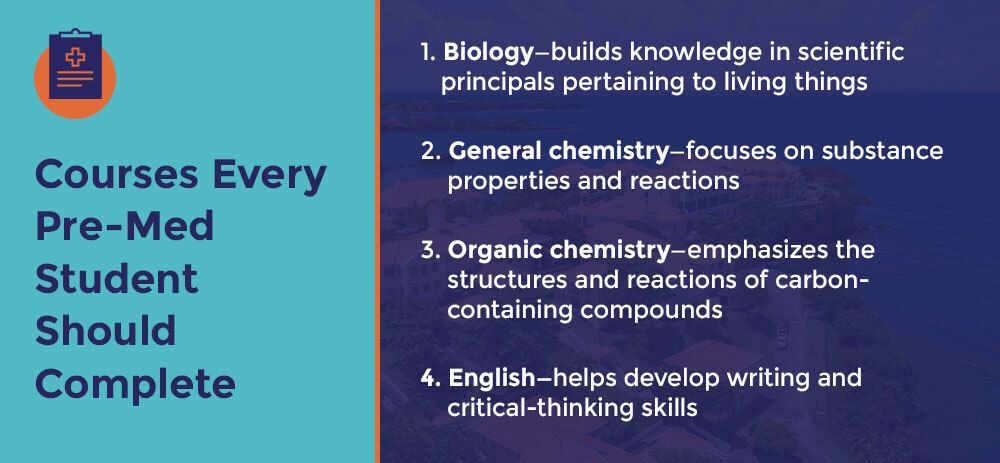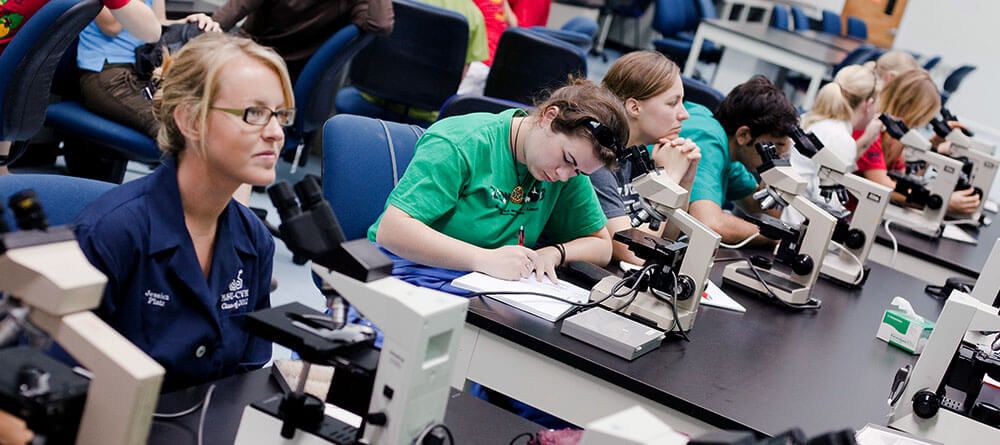It can seem like your journey to medical school starts when you begin working on your medical school applications. But a core part of your preparation as a pre-med student is building the framework of knowledge you’ll need to be successful in a Doctor of Medicine (MD) program.
This is what medical school prerequisites are for. Each program has specific course requirements to ensure that students are prepared for a rigorous curriculum once they begin studying medicine—some of those courses are actually great preparation for the Medical College Admission Test (MCAT).
While the specifics can vary from one institution to the next, there are a handful of standard prerequisites for medical school as well as some potentially required courses you should know about.
Commonly required courses for medical school
Believe it or not, many medical schools have a pretty short list of prerequisites. The Ontario Medical School Application Services (OMASAS) program overview indicates that some Canadian schools don’t have any prerequisites at all. Additionally, the Association of American Medical Colleges (AAMC) only mentions four core subjects that students will likely have to study.
The details can vary even further for medical schools that offer entrance paths for Canadian medical school candidates and international students who come from different education systems.
St. George’s University (SGU), for instance, offers seven-year, six-year, and five-year pathways in addition to the standard four-year MD program. This enables international medical students from the United Arab Emirates (UAE), India, Lebanon, Thailand, South Korea, and countless other countries to pursue a medical education.
Even with all this in mind, it’s still important for pre-med students to have a solid foundation in math and science. You can expect the four subjects listed below to be included in the required courses for medical school.

Biology: This subject helps students develop foundational knowledge of basic principles, such as cell structure and function, energy storage and transformation, genetics, and evolution. A lab component is typically required.
General chemistry: Completing coursework (and labs) in general chemistry helps students to apply the scientific process as they learn about chemical bonding, gas laws, solution properties, and acid-base equilibria. “I think chemistry is helpful not necessarily in answering questions on a test but for understanding concepts,” says SGU student Amber Hughes.
Organic chemistry: By attending organic chemistry lectures and labs, students develop their knowledge of the structure and reactions of carbon-containing compounds.
English: Medical schools look for students who are critical thinkers. Physicians also need to be able to convey information clearly, so exceptional writing skills are essential. International students who attend SGU have the opportunity to further develop relevant oral and written communication skills as part of a structured language program as they work toward their medical degrees.
There are a few more requirements for students applying to schools through the Texas Medical and Dental Schools Application Services (TMDSAS) and the American Association of Colleges of Osteopathic Medicine (AACOM). But all are included in most medical schools’ recommended courses, which you should complete if you can fit them into your schedule.
Recommended additional prerequisite courses for medical school
While most medical schools consider the below courses to be optional, it’s a great idea to consider incorporating them into your education if possible.
Biochemistry: This course helps students develop their knowledge of the structure and function of biological molecules. Keep in mind that 25 percent of the first MCAT section covers biochemistry concepts. “It’s a harder class, so you have to put in a lot of work, but it’s going to pay off for the MCAT,” Hughes says.
Genetics: Because it covers how traits are inherited and the ways in which DNA affects health, genetics is a useful subject for pre-med students.
Physics: Generally speaking, physics is the study of matter and how it moves. It’s an essential subject for pre-med students because many of these concepts are relevant to the medical field.
Math: “It’s good to take math—you still use it in medical school,” Hughes explains. A few examples include converting measurements for a patient’s chart or leveraging ratios to determine a medication dosage. Be sure to look into whether schools require a specific course, such as calculus.
Microbiology: In microbiology courses, you can expect to learn about the characteristics of microorganisms and how they interact with their environments. It serves as a foundation for understanding how microbes can be both harmful and beneficial.
Physiology: Building off basic biological principles, physiology focuses on how organ systems function. It’s often referred to as “the basis of medicine.”
Social science: Learning about human behavior by studying psychology, sociology, or something similar is vital for understanding how to work with patients—and it’s good exam practice. “There is a psychology and sociology section on the MCAT,” Hughes says.

Plan an effective pre-med education strategy
Because pre-med isn’t a major in itself, undergraduate students should be thoughtful about deciding which degree path is best for them. For Hughes, the decision to pursue neuroscience was pretty logical.
“When I chose my major, I wanted to make sure that I wasn’t having to do pre-med plus a major,” she explains. Hughes knew that selecting a program with few science courses would mean she’d need to take additional classes to meet medical school requirements.
But you also want to ensure you’re selecting an undergraduate path that you’ll do well in because your GPA will eventually be evaluated as part of your medical school applications. “You want to choose a major that you know you can succeed in while prioritizing your pre-med classes,” Hughes offers.
Timing your medical school prerequisites is also important if you’re currently pursuing a bachelor’s degree or a similar type of degree. While most programs allow students to participate in the medical school application process before they’ve completed all required coursework, it’s still a solid idea to complete those courses early. Hughes, for example, started addressing prerequisites during her first year of college.
If you’ve already graduated, take stock of which courses you may be missing, and then work to complete them as you’re able. Depending on how many course requirements you need to fulfill, completing a pre-med postbaccalaureate program may be an ideal option. Students considering an alternative entrance option, such as a six-year medical program, will likely be able to complete many of those courses once they begin their studies.

Move past med school prerequisites
Once you have a clear plan in place for completing your medical school prerequisites, you can start to look ahead and prepare for the additional components that will be incorporated into your medical school applications.
From garnering relevant medical experience and securing letters of recommendation to taking the MCAT, there will be a lot of ground to cover. Learn how to manage it all in our article “Planning Your Medical School Application Timeline: The Pre-Med Student’s Guide.”


